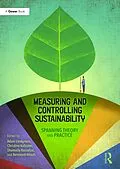Efforts to establish the measurement and control of sustainability have produced notable tools, but those instruments lack applicability in practice. Increasing the level of standardization of such tools also seems difficult to achieve, because the contexts surrounding the focal organizations differ considerably. Therefore, what we need is a systematic, interdisciplinary assessment of how to measure and control sustainability, so that we can establish an essential definition and up-to-date picture of the field.
Measuring and Controlling Sustainability attempts to provide such an assessment in 17 chapters, organized into four main topic sections: (a) organizations and social value creation: concepts, responsibilities, and barriers; (b) accounting, measurement, performance, and diffusion of social value; (c) practical and managerial insights from real-life cases; and (d) choices, incentives, guidance, and ethics.
This research anthology provides a comprehensive collection of cutting-edge theories and research that will further the development and advancement of measuring and controlling sustainable efforts in theory and managerial practice.
Autorentext
Dr. Adam Lindgreen is Professor of Marketing at Copenhagen Business School where he heads the Department of Marketing and Extra Ordinary Professor at University of Pretoria's Gordon Institute of Business Science. Dr. Lindgreen received his PhD from Cranfield University. He has published in California Management Review, Journal of Business Ethics, Journal of Product and Innovation Management, Journal of the Academy of Marketing Science, and Journal of World Business, among others.
Dr. Christine Vallaster is Professor of Marketing and Relationship Management at the University of Applied Sciences in Salzburg. Dr. Vallaster received her post-doctoral qualification from the University of Innsbruck (Austria). She has published in California Management Review, Journal of Business Research, European Journal of Marketing, and Journal of World Business, among others.
Dr. Shumaila Yousafzai is Associate Professor at Cardiff University, UK. Her research focuses on the contextual embeddedness of entrepreneurship, institutional theory, and entrepreneurial orientation. She is the Associate Editor of the Journal of Small Business Management and has extensively published in various international journals. She has also co-edited a special issue on women's entrepreneurship for Entrepreneurship & Regional Development and has edited volumes on women's entrepreneurship with Edward Elgar and Routledge.
Dr. Bernhard Hirsch is Professor of Management Accounting at Bundeswehr University Munich. He received his post-doctoral qualification (Dr. rer. pol. habil.) from WHU - Otto Beisheim School of Management (Germany) and his doctoral degree (Dr. rer. pol.) from Witten/Herdcke University (Germany). He has published in Management Accounting Research, Journal of Accounting and Organizational Change, Business Strategy and the Environment, International Journal of Physical Distribution & Logistics Management, and Financial Accountability & Management, among others.
Inhalt
List of figures; List of tables; About the editors; About the contributors; Foreword and acknowledgments; Part 1: Organizations and social value creation: concepts, responsibilities, and barriers; 1.1: The Responsible Care initiative as an enabler of implementing coporate social responsibility concepts in the chemical industry, Peter Letmathe and Ilja Rabinovitch; 1.2: Mind the gap! Existing barriers to standardizing the measurement of social value creation, Cecilia Grieco and Laura Michelini; Part 2: Accounting, measurement, performance, and diffusion of social value; 2.1: The sustainability balanced scorecard: an introduction to the SBSC and its links to accounting and reporting, Florian Lüdeke-Freund and Stefan Schaltegger; 2.2: Sustainability accounting standards in the USA - procedural legitimacy: governance, participation, and decision-making processes, Delphine Gibassier; 2.3: Adapting the measuring rod for social returns in advanced welfare states: a critique of SROI, Konstantin Kehl, Gorgi Krlev, Volker Then, and Georg Mildenberger; 2.4: Measuring the impact of strategic corporate social responsibility (S-CSR): finding the right approach, Fabian Herkenrath and Christine Vallaster; 2.5: A performance tool for policy-makers to monitor the dual objective of social enterprises: a data envelopment analysis approach, Matthias Staessens, Pieter Jan Kerstens, Johan Bruneel, and Laurens Cherchye; 2.6: Diffusion of sustainability: a road map for developing corporate compliance programmes with high diffusion potential, Duygu Türker and Ceren Altuntas Vural; Part 3: Practical and managerial insights from real-life cases; 3.1: The impact of environmental and social practices on the triple bottom line: a mediated model, Cristina Gimenez, Vicenta Sierra, Cristina Sancha, Joan Rodón, and Stefan Markovic; 3.2: Disclosing the invisible: measurement and disclosure pitfalls of carbon dioxide emissions, Nils Niehues and Andreas Dutzi; 3.3: Social entrepreneurship and social impact assessment: the case of euphoria, Florian Hoos; 3.4: Mechanisms and tools for measuring and reporting sustainability in the hotel industry: a practical dimension, Piotr Zientara and Paulina Bohdanowicz-Godfrey; 3.5: The growth of social banks: a new measurement approach, Nikolas Höhnke and Susanne Homölle; Part 4: Choices, incentives, guidance, and ethics; 4.1: An experimental study on corporate social responsibilty in junior managers' project choice in an energy-producing company, Matthias Sohn, Dominik Fischer, and Werner Sohn; 4.2: Design options for sustainability-oriented incentive systems, Robert Huber, Bernhard Hirsch, and Matthias Sohn; 4.3: Sustainability reporting: do the Global Reporting Initiative Guidelines provide clear guidance?, Rudiger W. Waldkirch and Bernhard Hirsch; 4.4: Sustainability and ethics in financial reporting: an empirical study of German, Austrian, and Swiss Groups, Peter G. Kirchschläger and Michaekla M. Schaffhauser-Linzatti; Index.
